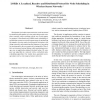Free Online Productivity Tools
i2Speak
i2Symbol
i2OCR
iTex2Img
iWeb2Print
iWeb2Shot
i2Type
iPdf2Split
iPdf2Merge
i2Bopomofo
i2Arabic
i2Style
i2Image
i2PDF
iLatex2Rtf
Sci2ools
112
click to vote
DATE
2005
IEEE
2005
IEEE
LORD: A Localized, Reactive and Distributed Protocol for Node Scheduling in Wireless Sensor Networks
The lifetime of wireless sensor networks can be increased by minimizing the number of active nodes that provide complete coverage, while switching off the rest. In this paper, we propose a distributed and scalable node-scheduling algorithm that conserves overall system energy by minimizing the number of active nodes, localizing the execution to the dying sensor(s), and minimizing the frequency of execution by reacting only to the occurrence of a sensing hole. This effects an increased system lifetime while maintaining coverage over an application-defined threshold value. We compare our algorithm to a network with a centralized nodescheduling algorithm. Our results show equivalent coverage degree over a wide range of sensor networks. Keywords Wireless Sensor Network, Coverage, Set Cover
Active Nodes | DATE 2005 | Hardware | Scalable Node-scheduling Algorithm | Wireless Sensor Network |
Related Content
| Added | 13 Oct 2010 |
| Updated | 13 Oct 2010 |
| Type | Conference |
| Year | 2005 |
| Where | DATE |
| Authors | Arijit Ghosh, Tony Givargis |
Comments (0)

